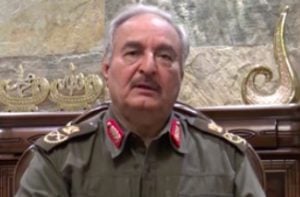By Jamie Prentis.

Tunis, 13 April 2017:
Khalifa Hafter has insisted that Moscow has not talked to him about military bases in Libya and has said that it cannot supply arms because of the UN embargo.
The House of Representative’s general commander of the armed forces, in an interview with the Moscow-based news agency Sputnik, said that Russia had no need of any Libyan bases because of its “giant fleet” in the Mediterranean.
He said that there had indeed been discussions about the resumption of arms purchases from Russia. Under Qaddafi, it been Libya’s principle weapons supplier. However, he had been told in Moscow that the supply could not resume until after the lifting of the UN embargo.
Hafter said that therefore the Libyan National Army (LNA) would not hesitate to turn to any country that was ready to arm it. “This is logical. No one should deny it us. We do not want to arm ourselves for aggressive purposes but only to defend and stabilise our country.”
Hafter said he agreed with the principle that the armed forces should come under civilian control. However, he added, just as the former the General National Congress had exerted control over the armed forces, so its successor, the House of Representatives (HoR), now exercised supreme command over him and the LNA.
Hafter insisted the HoR had made Ageela Saleh commander-in-chief of the armed forces and it also appointed him, Hafter, to run the military. “So how can anybody say that the the High Command refuses to work under civilian authority?”
He said the Presidency Council in Tripoli had proved itself incapable of exerting any authority over the militias and instead seemed intent on fighting him.
Despite the recent clashes between units nominally part of the LNA and the Misratan-based Third Force in the south of the country, Hafter insisted that there could not possibly be any military fighting between the LNA and the “national forces controlling the western region”.
He explained: “There can be no clash between the national army and any national forces, only a clash with terrorist organisations that believe exclusively in the logic of force.”
He added: “We seek to include all the regular forces under the banner of legitimacy and outside the circle of militias, in accordance with criteria determined by the law and imposed by the supreme interest of the country without any foreign interference .”
Hafter said that the LNA wanted to contribute to the political process provided it did not harm the interests of the Libyan people.
He said it would be “a waste of tine and effort to work outside the popular will”.
Sputnik taxed Hafter with the state of his relations with Egypt. The latter has made little effort to conceal its frustration, if not anger, at Hafter’s rejection of its mediation efforts and his refusal to meet Faiez Serraj in Cairo two months ago.
Hafter’s response to to Russian interviewer was that Libya and Egypt shared the same interests which were to eliminate terrorism and the Muslim Brotherhood.
Hafter also apparently reversed his previous refusal to meet Tunisia’s President Beji Caid Essebsi, who is part of the tripartite thrust among Libya’s eastern and western neighbours to broker some sort of political agreement in tandem with the UN, the Arab League and the African Union.






